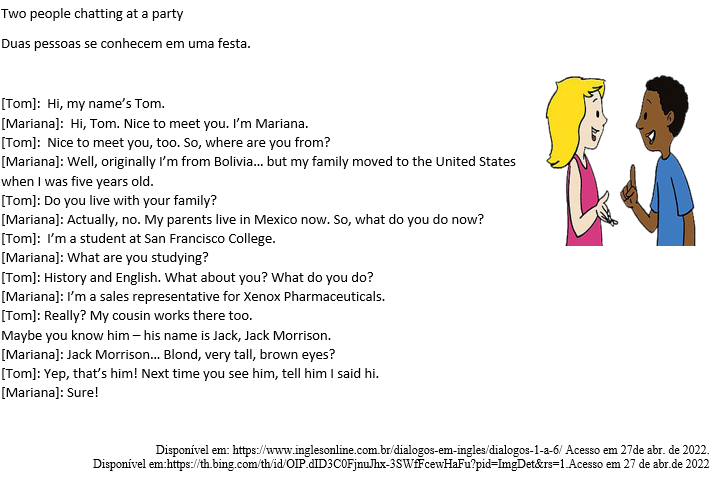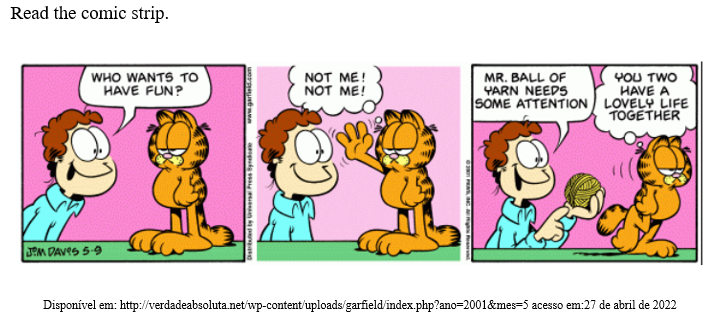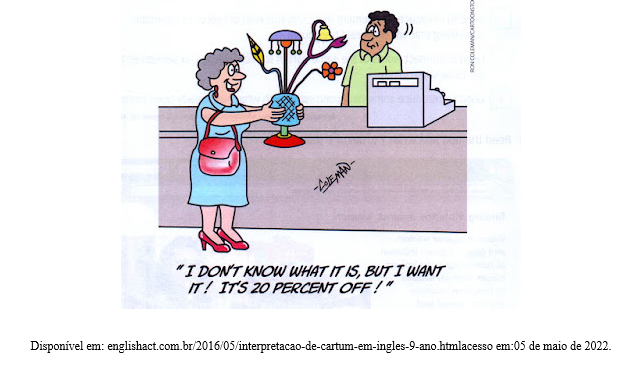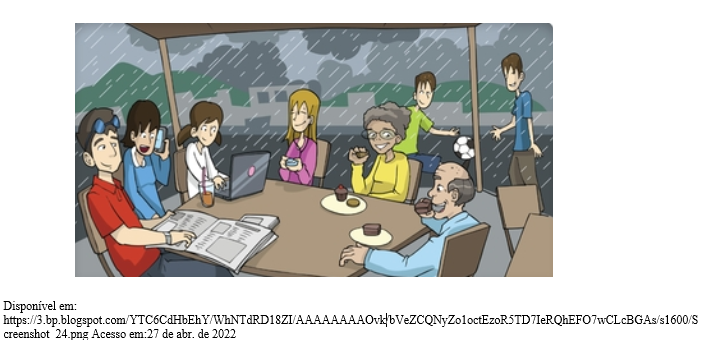AULA 10/2022 – Recomposição 6º ano – Língua Inglesa - 12/05/2022
Atividades 6º ano – Língua Inglesa – 1ª semana


1.Match the questions and answers abaut the text: (Relacione as perguntas com as respostas sobre o texto acima.)
| a) my name is | ( ) Sure! |
| b) Nice to meet you. | ( ) I’m Mariana. |
| c) where are you from? | ( ) Tom. |
| d) Do you live with your family? | ( ) I’m from Bolivia. |
| e) tell him I said hi. | ( ) My parents live in Mexico now. |
2. Put the dialogue in the correct order.(Numere o diálogo na ordem correta.)
( ) What are you studying?
( ) I’m a sales representative for Xenox Pharmaceuticals
( ) History and English.
( ) I’m a student at San Francisco College.
( ) What do you do?
3. Write your personal information (Escreva suas informações pessoais).
a) What your name?
b) How old are you?
c) Where are you from?
d) Do you live with your family?
e) Do you study?
f) What do you like to do?


4. Answer these questions in English. (Responda essas questões em inglês.)
a) Garfield quer se divertir?
b) Quem precisa de atenção?
5. Read the text
The cultures of the indigenous Indians, Africans, and Portuguese have together formed the modern Brazilian way of life. The Portuguese culture is by far the dominant of these influences; from it Brazilians acquired their language, their main religion, and most of their customs.
The Indian population is now statistically small, but Tupí-Guaraní, the language of many Brazilian Indians, continues to strongly influence the Brazilian Portuguese language; other Indian contributions to Brazilian culture are most apparent in the Amazon basin.
Disponível em: https://www.britannica.com/place/Brazil/Cultural-life Acesso em 27 de abril. de 2022.
6. Retire do texto acima as palavras em língua inglesa que quando escritas lembra palavras da língua portuguesa.
7. Depois que você reconheceu as palavras do texto em língua inglesa que quando escritas lembra palavras da língua portuguesa, releia o texto, identifique a ideia central e traduza-o.
Atividades 6º ano – Língua Inglesa – 2ª semana
Leia o cartum a seguir e responda as atividades.

8. Ao ler o cartum, observa-se que o autor aborda um problema relevante na nossa sociedade. Identifique e escreva a seguir que problema é esse.
9. A mulher demonstra o interesse em comprar o produto que ela nem sabe o que é, e para efetuar a compra faz uma proposta. Que proposta foi essa?
10. Sabemos que o Simple Present pode descrever uma rotina, uma verdade universal ou uma opinião. Desse modo, analise a frase da mulher “I don’t know what it is,” identifique e comente sobre o uso do Simple Present.
11. Escreva frases afirmativas, negativas e interrogativas usando os pronomes entre parênteses.
Exemplo:
I drive.
I don’t drive.
Do I drive?
a) play (she)
b) eat (you)
c) like (we)
d) drink (they)
e) watch (he)
f) read (you)
g) study (she)
h) kiss (he)
12. Complete as sentenças usando os verbos no Simple Present. (Os verbos estão entre parênteses e quando for negativa estará indicado com a palavra “not”)
a) Pedro, Márcia, and Isabela Always ________ (ask) a friend when they _________ (not/know) the meaning of a word.
b) Clara usually _______ (try) to guess the meaning of the words.
c) Rodrigo and Fabio always _______ (use) the dictionary to check the meaning of key words. Fabio also _______ (study) the spelling and the pronunciation of the new words.
d) Susana _______ (skip) the words she ________ (not/understand) but she never _______ (go) back to them later.
e) Bia ______ (guess) the meaning from the contexto, and Lucas often _______ (do) that, too. Lucas ______ (have) a good bilingual dictionary and he sometimes ________ (use) it to confirm his guesses.
13. Underline the correct the simple present form in bold. (Sublinhe a forma correta do simple present que está em negrito.)
a) I don’t know /doesn’t know the answer.
b) Most trees don’t grow/doesn’t grow very quickly.
c) Do/Does Sara understand this?
d) Do/Does you want to talk about it?
e) I don’t think/doesn’t think he’s very nice.
g) she don’t see/doesn’t see our grandparents very often.
h) They don’t live/doesn’t live very near.
14. Complete o texto com os verbos: drink, eat, have, listen, play, rain, read, sit, talk e write (no presente contínuo).

Hi everyone. We’re on holiday in Germany but the weather is bad today. It ______________. We ________________ in a café at the moment. I’ve got my computer and I ____________ my blog.
My sister ___________ to music. My brothers aren’t in the café. They ____________ football in the rain! My mum _____________to her friends on the phone. And my dad? He ________________ the newspaper. Oh yes, and my grandparents are here too. They ________________cakes! I haven’t got a cake but I ______________ fruit juice. I like it!
We ______________a good time. See you soon.
15. Suponha que você esteja em férias com a sua família e complete o texto abaixo com os verbos: drink, eat, listen, play, read, sit, swim, talk e write (no presente contínuo).
Hi everyone. We’re on holiday in Bahia.
The weather is good today. We’re at the beach.
I _____________________________________________
My brother/sister ________________________________
My mum/My dad ________________________________
My grandparents ________________________________
We’re having a great time.